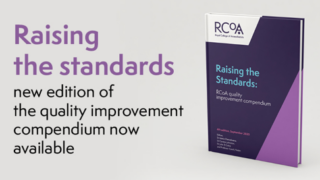Every day, we are seeing more ways in which the Coronavirus (COVID-19) pandemic is making ‘the new normal’ difficult to navigate. In my anaesthetic clinic this week, I will speak to patients waiting for surgery who have changed their lifestyle completely since the initial lockdown. Many have stopped regular exercise after they were told to shield at home, some are too frightened to go outside. Many are struggling with poor mental health, waiting anxiously for surgery or fearful of catching the virus. I have much sympathy for the many patients who have struggled with their eating habits, as I try to get my own back on track.
In every interaction along our patients’ pathway, we must make sure we do the best we can
For those waiting for surgery, these are not minor issues. The period of reduced elective activity during the initial coronavirus surge has left perioperative medicine with 3 big issues: many more patients waiting for surgery, often in poorer health, and reduced capacity to undertake surgical treatments due to changes in infection control protocols, bed pressures and staffing.
More than ever, it is vital for us to make the most of what we’ve got. In every interaction along our patients’ pathway, we must make sure we do the best we can: providing the best information and shared decision making, optimising comorbidities, safe and efficient intraoperative care, good analgesia, holistic and effective recovery. Doing the simple things well means that our patients will be healthier on the day of surgery, we can treat more of them and treat them promptly, avoiding complications and minimising recovery times. By following best practice, we can get more people back to good health as quickly as possible.

Creating a QI compendium
Over the last 2 years, we’ve been gathering best practice standards relevant to anaesthesia, to produce the latest version of the Royal College of Anaesthetist’s QI compendium. This much-loved publication is colloquially called the ‘recipe book’, for many years the ‘audit recipe book’. This is the fourth iteration with a stronger QI focus. Each ‘recipe’ is a topic area, listing best practice standards, audit measurements and guidance on how to improve performance. The book starts with a guide to improvement science, a text book covering key knowledge, skills and behaviours needed to follow the improvement suggestions throughout the book.
For instance, the ‘recipe’ on peri operative diabetes lists the Joint Diabetes Society’s perioperative care guidelines, audit measures across preoperative, intraoperative and postoperative care, and suggested ways to improve prescribing of insulin, blood glucose monitoring and engaging patients and staff in making changes. In three short pages, it’s all you need to know about the best diabetic care, and how your unit can improve to meet those standards.
There are 136 recipes in total in the compendium, with over 120 contributors – consultants, nurse specialists and trainees, often experts in their field. With so many contributors, it is almost a crowdsourced guide across anaesthetic practice. As well as perioperative care, pain medicine and critical care, it also covers topics like staff fatigue and wellbeing, training and supervision, and environmental sustainability.
There are many things that are more difficult in ‘the new normal’, for our patients and for us in perioperative care. We hope this new QI compendium will make it easier to understand and achieve best practice standards, and so make navigating this tricky period just a little bit easier.
Read the QI compendium in full on the RCoA website, authored by:
Dr Carolyn Johnston
Prof Carol Peden- Health Foundation Qaulity Improvement fellow and Q community member
Dr Maria Chereshneva
Dr John Colvin
Comments
Thomas John Rose 1 Mar 2021
Lots of interesting information and examples. Are the UK Clinical Trials Regulations relevant to some of the QI projects discussed in the QI compendium?